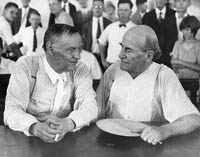
Clarence Darrow and |
A family friend was giving a talk at the American Anthropological Association’s Annual Meeting in DC this last week, which exposed me to a wide variety of interesting and intellectually diverse subjects from many different speakers.
One brief lecture that hit close to a subject I hold dear came from Richard Robbin SUNY at Pittsburgh, who described himself as “to the left of Richard Dawkins,” which got a laugh out of myself an a few others. Mr. Robbin’s focus was the Scopes Monkey Trial of 1925 over the teaching of evolution. Robbin argued that, in alienating Evangelicals over Evolution, liberals lost one of their strongest allies.
He specifically examined William Jennings Bryan, the prosecuting attorney in the trial, and someone who history has characterized as foolish and stubborn for fighting against teaching evolution so ferverently. The film Inherit the Wind makes him out to be overly zealous in his faith, oppressively conservative, but Bryant was in fact quite liberal in many respects. He supported women’s suffrage, a progressive tax system, and social support services.
It was his egalitarian concerns that prompted him to so vehemently oppose the teaching of evolution, which, in the textbook Civic Biology, was being used to advocate eugenics, selective breeding programs, and the sterilization of undesirables.
In an exerpt on “The Races of Man,” the book describes Caucasians as “the highest type of all.” But this is nothing compared to what comes later, when the textbook advises eugenics as the best way to improve the human race as we can clearly see in these passages from pages 263 – 265 of the text:
Improvement of Man. — If the stock of domesticated animals can be improved, it is not unfair to ask if the health and vigor of the future generations of men and women on the earth might not be improved by applying to them the laws of selection. This improvement of the future race has a number of factors in which we as individuals may play a part. These are personal hygiene, selection of healthy mates, and the betterment of the environment. (p. 261)
Eugenics. — When people marry there are certain things that the individual as well as the race should demand. The most important of these is freedom from germ diseases which might be handed down to the offspring. Tuberculosis, syphilis, that dread disease which cripples and kills hundreds of thousands of innocent children, epilepsy, and feeble-mindedness are handicaps which it is not only unfair but criminal to hand down to posterity. The science of being well born is called eugenics. …
Parasitism and its Cost to Society. — Hundreds of families such as those described above exist today, spreading disease, immorality, and crime to all parts of this country. The cost to society of such families is very severe. Just as certain animals or plants become parasitic on other plants or animals, these families have become parasitic on society. They not only do harm to others by corrupting, stealing, or spreading disease, but they are actually protected and cared for by the state out of public money. Largely for them the poorhouse and the asylum exist. They take from society, but they give nothing in return. They are true parasites.
The Remedy. — If such people were lower animals, we would probably kill them off to prevent them from spreading. Humanity will not allow this, but we do have the remedy of separating the sexes in asylums or other places and in various ways preventing intermarriage and the possibilities of perpetuating such a low and degenerate race. Remedies of this sort have been tried successfully in Europe and are now meeting with some success in this country.
This is the textbook that John Scopes was teaching his students from, and the ideas Bryan was fighting against. The teaching of evolution science is crucial to our modern understanding of biology, and alternative, purely theological alternatives have no place in a biology classroom, but these textbook passages are abhorent.
Our tendency is to dismiss Bryan as an ignorant baffoon, but the scientists concluding that evolution justified eugenics were equally ignorant and baffoonish and amoral. It’s important that we acknowledge that.
There’s also an essay by Steven Lubet, professor of law at Northwestern University that supports mine and Richard Robbin’s points.
The complete text of George William Hunter’s Civic Biology: Presented in Problems is available at Google Books.
Comments
2 responses to “The Complex William Jennings Bryan”